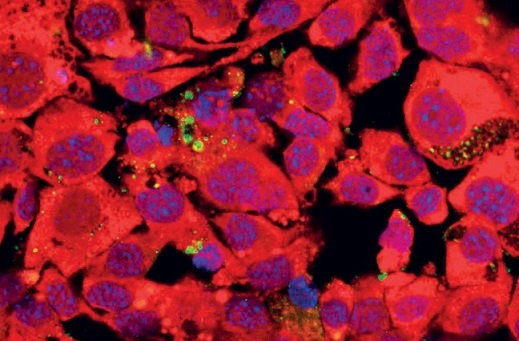Japanese Case Study Highlights That SARS-CoV-2 Can Remain Dormant in Humans and Be Reactivated following Allo-HSCT
Nikhil Prasad Fact checked by:Thailand Medical News Team Jul 03, 2025 7 months, 1 week, 4 days, 4 hours, 35 minutes ago
Thailand Medical News: Disturbing Possibility of Viral Reactivation Emerges from Japan
In a tragic and eye-opening medical case from Japan, researchers have documented what they believe to be the reactivation of SARS-CoV-2 in a patient following an allogeneic hematopoietic stem cell transplant (allo-HSCT). This
Thailand Medical News report is based on a clinical case involving a 42-year-old man with severe aplastic anemia who initially experienced a mild bout of COVID-19, tested negative weeks later, but went on to suffer fatal respiratory failure from a suspected reactivation of the virus five months after the initial infection and two months after his stem cell transplant.
 Japanese Case Study Highlights That SARS-CoV-2 Can Remain Dormant in Humans and Be Reactivated following Allo-HSCT
Japanese Case Study Highlights That SARS-CoV-2 Can Remain Dormant in Humans and Be Reactivated following Allo-HSCT
The study was led by a team from the Department of Hematology, Endocrinology, and Metabolism, the Department of Hematopoietic Cell Therapy, and the Laboratory of Hematology and Oncology at Niigata University, Japan.
A Case That Challenges Medical Assumptions
The patient, who had previously undergone thymectomy and long-term steroid treatment for myasthenia gravis, was immunocompromised and displayed severe lymphopenia and hypogammaglobulinemia. He developed mild COVID-19 and received remdesivir. After apparent recovery—confirmed by a negative antigen test on day 27—he underwent allo-HSCT three months later.
Despite a seemingly stable recovery, the patient suddenly developed progressive respiratory failure two months after the transplant. RT-PCR testing at that time revealed a high viral load with a low cycle threshold value of 18.6, indicating active viral replication rather than residual viral fragments. This suggested that SARS-CoV-2, undetectable in the upper airway, had remained dormant in the lower respiratory tract and was reactivated during the patient’s immunosuppressed state post-transplant.
No Contact, No Visitors, Yet COVID Returns
The case is particularly alarming because the patient had remained hospitalized in a sterile ward with no known exposure to new infection sources. There were no other COVID-19 cases among patients or staff in his unit, and he had not left the hospital. These circumstances make reinfection highly unlikely and instead strongly support viral reactivation.
Further investigations revealed bilateral ground-glass opacities and consolidations in the lungs—classic signs of COVID-19. Despite aggressive treatment with remdesivir, dexamethasone, and tocilizumab, the patient’s condition deteriorated, and he passed away on day 68 after the transplant.
Insights into SARS-CoV-2 Persistence and Reactivation
The researchers explained that SARS-CoV-2 can persist in tissue reservoirs such as the lower respiratory tract, gastrointestinal system, lymphatic tissues, and even the nervous system. In this patient, immunosuppressive therapy likely delayed viral clearance and created a conducive environment for reactivation.
Unlike persistent infection, which involves ongoing low-level replication, viral reactivation refers to a dormant virus suddenly entering a lytic phase, triggering active replication. This distinction is crucial because reactivation poses sudden, often more severe threats, particularly in immunocompromised individuals like stem cell transplant recipients.
The patient also had a prior adenovirus infection post-transplant, further suggesting a compromised immune defense. According to the researchers, the initial mild infection may have been subdued by the lack of a strong immune response, while the post-transplant immune reconstitution could have inadvertently triggered a hyperinflammatory reaction that led to acute respiratory distress syndrome (ARDS).
Recommendations and the Need for Vigilance
The study strongly recommends that hospitals adopt RT-PCR testing protocols both before and after allo-HSCT—even for asymptomatic patients with negative antigen tests. Current antigen tests have low sensitivity and may miss underlying viral persistence. Additionally, signs such as ground-glass opacities in CT scans, even in the absence of symptoms, should be closely evaluated in transplant patients with prior COVID-19 infections.
Though monoclonal antibodies and IVIG (intravenous immunoglobulin) are sometimes used to manage immune deficiencies, their effectiveness in preventing SARS-CoV-2 reactivation remains uncertain.
A Cautionary Conclusion
The researchers emphasize that COVID-19 continues to pose a serious risk to immunocompromised patients, even in the era of the seemingly milder Omicron variants. Reactivation of SARS-CoV-2—though still a relatively underreported phenomenon—can lead to fatal outcomes and must not be underestimated. The case serves as a strong reminder that viral persistence and immune system vulnerabilities can create a dangerous combination, particularly in stem cell transplant recipients.
The conclusion is clear: ongoing vigilance, better screening protocols, and further research into viral reactivation are urgently needed. SARS-CoV-2 reactivation, though rare, is real and potentially deadly, especially in vulnerable patient populations.
The study findings were published in the peer-reviewed journal: Cureus
https://www.cureus.com/articles/372776-fatal-sars-cov-2-reactivation-after-allogeneic-hematopoietic-stem-cell-transplantation-for-severe-aplastic-anemia#!/
For the latest COVID-19 News, keep on logging to
Thailand Medical News.
Read Also:
https://www.thailandmedical.news/news/breaking-u-s-nih-study-shockingly-reveals-sars-cov-2-viral-persistence-throughout-human-body-and-in-the-brain-even-in-those-who-were-asymptomatic
https://www.thailandmedical.news/news/long-term-dysregulation-of-the-gut-in-response-to-sars-cov-2-viral-persistence-contributes-to-long-covid
https://www.thailandmedical.news/news/covid-19-news-study-shows-that-sars-cov-2-disarms-innate-immunity-in-recovered-individuals-to-pave-the-path-for-viral-persistence-in-lungs
https://www.thailandmedical.news/articles/coronavirus
